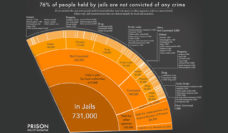Public Health Post: How does your work apply to public health?
Marcella Alsan: Our recent work on assessing whether accreditation can improve correctional health care in jails is particularly relevant to public health. Many sheriffs will tell you they are the number one mental health care provider in the U.S. – and over 95% of arrested individuals return to the community. So ensuring that those incarcerated have access to proper treatment and prevention is important for broader public health.
PHP: Tell me about the study you are currently working on and how you developed the idea.
Crystal Yang and Marcella Alsan: Since the Supreme Court’s 1976 landmark decision in Estelle v. Gamble, federal and state correctional systems (including prisons, jails, and juvenile detention facilities) have been constitutionally mandated to provide “reasonably adequate” health care to the incarcerated population. Yet, unlike health care systems that provide services to the nonincarcerated population, there is no legally mandated accreditation system for the health care provided in U.S. correctional systems, including jails.
As a result of this lack of oversight, there has been a lack of standardization of care in correctional facilities. We decided to causally estimate the effect of the National Commission on Correctional Health Care (NCCHC) accreditation through a randomized control trial. NCCHC is known as a pioneer of standards for correctional healthcare, and their voluntary accreditation program provides a framework of care for the incarcerated. We are using this study to examine whether accreditation improves health care processes, inmate health outcomes, and satisfaction and retention among correctional staff, and potentially reduces recidivism, litigation, and health care costs for jails.
PHP: How has COVID-19 changed the way you think about your work?
C.Y. and M.A.: When COVID struck, we put the accreditation project on hold and pivoted to fielding a survey with the NCCHC to assess the challenges of facilities across the country, as well as the strategies they had developed to deal with the novel virus. The survey included over 400 facilities and assessed things such as whether the facilities had adequate PPE, how they were isolating inmates, whether they were changing their release and intake policies as a result of COVID, and their infection rates. That survey lasted for several months and data from it informed the NCCHC COVID webinar series. Though our team has now re-focused efforts on the accreditation project, our work during the COVID pandemic has directly influenced the priorities of this project – understanding how to best coordinate efforts between authorities at the organizational- and policy-level, expanding preventive measures to minimize adverse outcomes, and prioritizing the needs of the hardest hit communities.
PHP: What more needs to be done to address health care disparities?
M.A.: We are looking at only a very small piece of the problem. But in many developed countries, there is a robust health system that actually provides care for people and pays for them within and outside of correctional centers. Because of the Medicaid Inmate Exclusion Act, benefits do not naturally flow to people who are arrested, and this creates a lot of the challenges counties are dealing with in terms of cost.
C.Y.: Counties struggle to provide care while individuals are incarcerated given limited budgets. Communities struggle to reintegrate released individuals, many of whom do not re-enroll even after incarceration and who may enter their communities with worse health conditions. This policy poses real concerns for maintaining continuity of care for justice-involved individuals.
Photos of Alsan (left) and Yang provided














